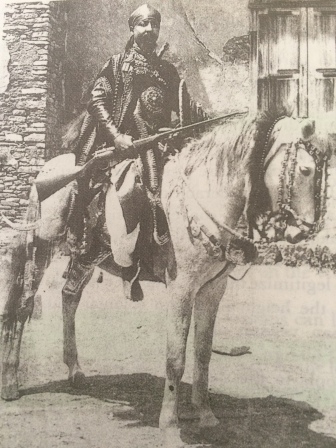
What if I could interview my ancestor? How would that conversation go? What if, one day there he was…sitting on my couch ready to tell me stories and show me photos?
Apart from his long, thick, grey beard, I would imagine the most prominent part of his appearance would be an extra-long and thick gabi (Ethiopian cotton shawl) covering his body from neck to knee. A gabi that would have witnessed many interesting times, I am sure.
He would probably wear a gentleman’s hat, the kind you only see on mafia movies…wide brim. He would display an aura of confident serenity that I was drawn to. His eyes would be kind and captivating. Here are some of the questions I would ask…
Part I – Characters of Adwa
Me: Do you have a favorite quote/saying?
Yes. It goes: “One collects our plants, another our stones; I do not know what you are looking for, but I do not want it to be in my country that you find it”. Hahaha.
Me: Haha. Who said that?
If you listen, I am about to tell you.
Me: Oops, sorry…
Dajjach Webe Hayla-Maryam of Semen said it about the many European scientists who visited Ethiopia. He was not happy with the idea of them digging around our land. You see, we never trusted the Europeans, never trusted anyone actually…it’s just how we highlanders are built, it’s in our genes. We are protective of our land for survival and that was always our key advantage.
Me: Makes sense…ain’t nobody taken my stuff!
Exactly.
Me: I have always wondered…who were the actual generals who defeated the Italians in the famous Battle of Adwa?
Ok, they are…Ras Mikael of Wallo, Ras Makonnen Walda-Mikawl, Ras Managasha Yohannes and Negus Takla-Haymanot

Ras Mangasha Yohannes, 1889-1898
Me: Wow, he is not playing…he is about to destroy some European butt.
Ok, so I know that Empress Taytu, Wife of Emperor Menelik founded the capital city Addis Ababa, but why did she choose that particular location?
There were many reasons…one of them was that the Empress liked to visit the hot springs in the plains south of Entoto Hills where she and the Emperor lived in 1881.
They went to Entoto so they were above all their enemies during their many battles to take control over the region.
Me: Interesting…
Also, by then the Emperor by had taken over the surrounding areas of Entoto so it was no longer necessary to be on the hills. It was also very cold up there.
Me: Wow, ok. So Addis was founded mainly because the Empress liked her steam baths?
Yes, don’t you like steam baths? She not only made the decision but she moved the entire Imperial court down there when the Emperor was away in Harar.
Me: I like her style! The Queen B!
Anyway…Taytu was a woman of exceptional strength of character. In fact, she became more powerful when her husband Menelik became sick in his last days. She rounded up her relatives and arranged marriages between specific people in her family to keep her power. She would have remained in power if they didn’t plot against her and banish her!
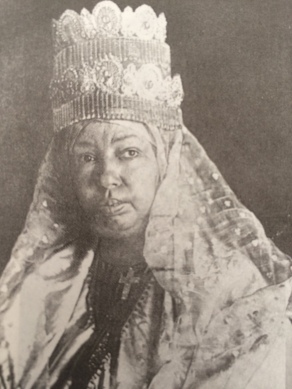
Empress Taytu Betul, wife of Emperor Menelik II
Me: Who banished her?
Ras Tasamma and Fitawrari Habta-Giyorgis were the main people who plotted against her. They rallied up other men who had didn’t like her too. Even the Archbishop was asked to pass a demand on Taytu to stay away from government affairs and to tend to her husband alone!
She tried to get support from the Church and even her foreign friends but none of it worked and she was forced to leave the palace and live the rest of her days at her favorite shrine on Entoto Hills.
Me: Wow…that’s so sad!
Yes, it is. She also founded the first hotel in Addis Ababa. First it was named ‘Etege’ (Her majesty) after her title, then ‘Awraris’ (rhinoceros)…don’t ask me why! Finally it was renamed Taytu which is what it is called today.
Me: Yes I know that hotel!
Of course. My favorite thing she ever did was her contribution to the dismissal of the Treaty of Wechale, it was in fact largely inspired by her.
Me: What was the Treaty of Wechale??
Sigh…do you know anything?
It was a Treaty that Ethiopia signed with Italy in 1889 before the great Battle of Adwa. The original intention was so that Menelik will not get in the way of Italy’s conflict with Emperor Yohannes in the North. In exchange Menelik was promised 5,000 Remington rifles. But the Italians gradually started to present different versions of the Treaty and the Italians added more clauses giving them access to more and more Ethiopian territory. On the final version, the Italians purposely added a discrepancy between the Italian and the Amharic version.
The Italian version forced Ethiopia to become a protectorate of Italy…so Ethiopia could only make foreign contacts through Italy…imagine that…whereas the Amharic version showed this protectorate status as optional.
The Italians tried very hard to get Menelik to accept the Italian version of the Treaty, but on advice from his wife Taytu, he dismissed it in February 1893. The Italians then had to resolve to battle to try and occupy Ethiopia!
Me: Wow, and the other Europeans just let Italy do that?
What do you mean? Of course, the Europeans were more than supportive of the Italian version! An African chief surrendering his sovereignty to a European power was the norm rather than the exception at the time!
Me: Ok got it! Very cool. What else…?
There were other incredible people too in Ethiopia from 1896 to 1935. Extraordinary people…
Me: Likeeee…?
My good friend Warqenah Eshate for example or ‘Hakim’ (Doctor) as we called him. He was found on the battlefield by a British officer at the age of four and they took him away to England. He later went to India and Scotland where he trained as a medical doctor.
He returned to Ethiopia in the early twentieth century, as Dr Martin…the name the British gave him mind you. When he returned, he recovered his Ethiopian family and his name and served his country in many honorable ways. He was a Director of schools, negotiator and Ethiopian Minister to London when the Italians invaded in 1935. He was also a fierce campaigner against slavery and the slave-trade!
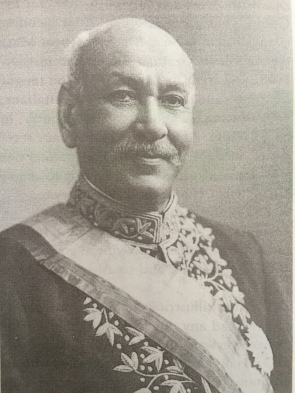
Hakim Warqenah Eshate (Dr Martin)
Me: Wait…there was slavery in Ethiopia?
Of course, all African countries kept slaves back then! In Ethiopia, an official decree to stop slavery was only issued in March 1924!
Me: Wow…who ended it?
The British actually held a strong campaign against it in Ethiopia but even domestically it became expensive to maintain large numbers of slaves in the 1920s.
Me: Ok…who else did you know?
Let’s see, there was Afawarq Gabra-Iyayasus who published the first Amharic novel ‘Tobya’ while travelling in Italy. The Italian’s called him Professor..haha.
Also, the students who went to Russia returned with medical training and helped to set up Menelik II Hospital in 1910, which stands to this day.
Me: Something I am always curious about…how did we actually win the Battle of Adwa…in military speak?
Very simple. It all led up to the great battle on February 29th, 1896. Before that the Italians had built a fort in the North. The Ethiopians surrounded the fort and denied them access to food, water and reinforcements.
Finally, the Italians negotiated and the Italians were allowed to come out and join the rest of their army in exchange for a peaceful resolution. The Ethiopians even gave them mules and pack-animals!
Me: Ok so that’s how it ended!
No! I haven’t finished!
Me: Ok, ok, sorry…then what happened!
The Italians were not ready for peace. Menelik and his troops then marched to the two main Italian forts in Addigrat and Entticho and waited for the Italians to come out.
Menelik’s Eritrean spies lied and told the Italians that if they fight the Ethiopians, it would be an easy victory. The Italians launched a surprise attack from three directions on February 29th. But they could not effectively coordinate the three armies. They also misread their maps and one of their armies got trapped by the Ethiopian troops. The other two armies came to rescue them but made a fatal swerve to the right instead of the left and history was made! By midday March 1st the Battle was over.
Me: Wow, so that’s what happened! How did it make y’all feel?
Not just us, it changed the perception of the whole continent! George Berkely said it best. He was a colonial British historian. He said “The suggestion has even been made – absurd as it appears at present – that this is the first revolt of the Dark Continent against domineering Europe” Hahaha.
Me: Hahaha…the Dark Continent? They were so surprised that we won? Wow, that’s rude!
That was exactly what they thought of Africa, it’s not surprising.
Part II – Iyassu & Zewditu
Me: So what happened after Adwa?
Well, Menelik didn’t die until 1913…haha…his first stroke was in 1906! He was as strong as a bull! Then it became Iyassu’s turn to lead.
Me: Was Iyassu Menelik’s son?
No, his grandson. Son of his daughter Shawaragga.
Me: Cool name! Shawa-ragga…ragga-muffin…ragga-star
Are you ok? There is something wrong with you…
Me: No I am perfect Grand-grand-grand-grandpa…haha. So Menelik announced his successor before he passed.
Yes..Iyassu. That’s him on the right.
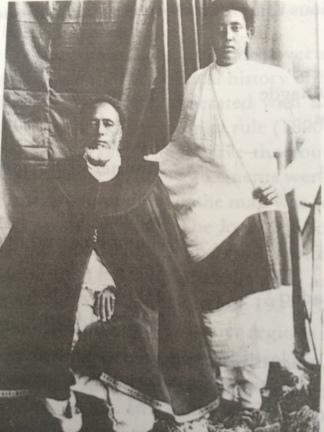
Lej Iyyasu and his father Ras Mikael of Wallo
Me: So what was Iyassu like?
He was…handsome. A great athlete and spokesperson. Unfortunately he had a reputation as a playboy and a bit of a spoiled brat. But keep in mind he had a lot of enemies with a very strong eye for the throne themselves! He actually did the country a lot of good too which is always overlooked.
He put an end to the ‘quragna’ system, when the plaintiff was chained to the defendant and the creditor to the debtor until justice was found!
He also tried to mitigate the abuses of the ‘leba shay’, a stupid traditional mode of detection of criminals, in which a young boy would be given a powerful drug and let loose in the neighborhood; the unfortunate owner of the house where the boy finally collapsed would be declared the culprit! I mean, can you believe?
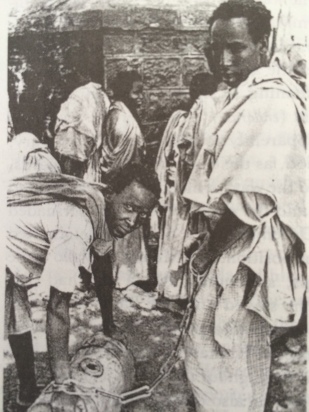
The quragna system
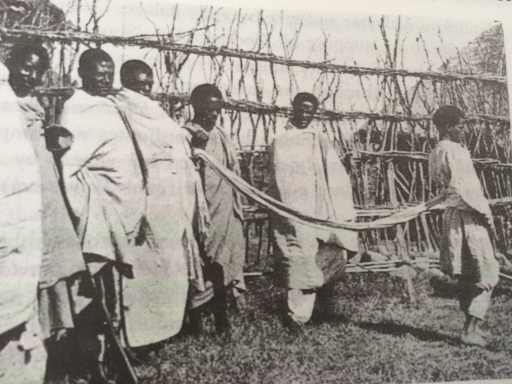
A leba shay
Me: That’s great that he did that!
He also exposed large-scale embezzlement…although he also abused the policy by framing people he did not like. Haha.
Me: Hahahaha
So yes, contradiction and inconsistency were the hallmark of his character!
Me: They must have loved him in the court!
They hated him. He challenged everything about post-Adwa Ethiopia. He is quoted to have told Menelik’s old guard to not follow him when he is travelling without his permission. “You have grown old and fat” he said.
Me: Damnnnn…that is gangster! He must have had a lot of enemies!
Yes, biggest of which was the church but all his close confidants turned on him too! The church hated him because he tried to bring both religions together, Orthodox and Islam. He married daughters of Muslim chiefs and constructed Mosques. Although he also founded churches and monasteries, that was ignored and his flirtations with the Islam faith was used as the excuse to start the coup against him in 1916…and his untimely end.
I mean, there was never any official proof of Iyassu’s conversion to Islam, even the Archbishop of Ethiopia told Iyassu’s enemies this when they approached him to release them from their oath of allegiance to Iyassu. In the end, however, he gave up to their pressure to remove Iyassu from the throne.
It was on 27 September 1916 that Iyassu was officially deposed and Zawditu…Menelik’s daughter from a previous wife…was commemorated as Empress of Ethiopia with Ras Tafari Mekonen designated as heir to the throne.
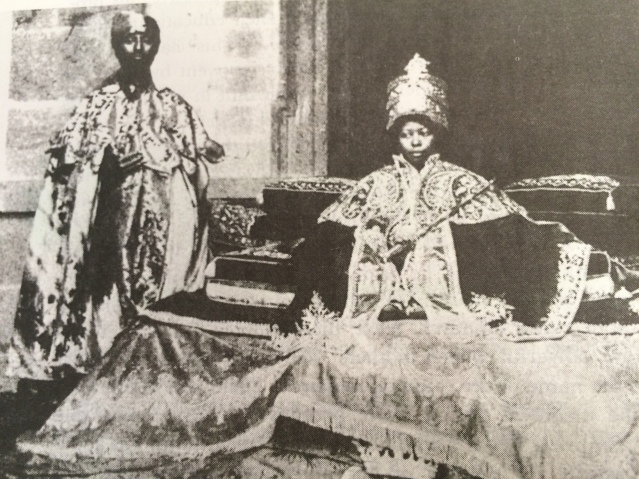
Empress Zawditu Menelik 1916-1930
Me: Did Iyassu do anything to stop them? Did he fight?
He was out of town when it happened. He heard about the deposition and ran back to Addis but was confronted midway between Addis and Dire Dawa by 15,000 troops. He fled to the Afar and was never heard from since.
Me: Wow, scandalous! Wait, Ras Tafari…that’s Haile Sellasie right? Where was he this whole time?
Oh he was always politically involved, but in the background. He was well educated and was deeply involved in the political discussions that finally led to Iyassu’s overthrow. He also had strong relationships with the British, Americans and French. Poor Zewditu did not stand a chance against him.
Me: What do you mean?
Well she was a woman of the church, educated by holy books. She was a hopeless romantic, disinterested in politics and the traditional conservative monarchy line she came from was at threat.
So what I am saying is, it was just a matter of time before Tafari took over the throne.
Me: How was she a hopeless romantic!?
She really loved her husband Ras Gugsa Wale, he was Taytu’s nephew. They were living happily in Falle while Iyassu was in power but when he was deposed, the nobility separated her from her husband and put her on the throne. When Tafari became Emperor, her husband blamed Tafari for separating him from his wife and challenged him to battle. She wrote many letters to her husband pleading for him to surrender to Tafari, but Gugsa refused and died in battle. Zewditu was heartbroken with grief and died a few days after him.
Me: Awww…so sad!
Well, that’s not the end of it. Life moves on…you know.
Me: Sad emoji!
What?
Me: Don’t worry about it. Ok soooo…Tafari becomes King of Kings…
He becomes King of Kings but not before a few people tried to stop him! As soon as he took power he started dismissing the ministers of the old court. One of them, The Minster of War, Habta-Giyorgis Dinagde famously said “We were seated when we rose him up but now, even if we stand, we cannot reach him”. Haha. You see? They put him in power but he betrayed them.
Another person who protested was the great Dajjach Abba Weqaw Berru, the mutineer! He is my favorite.
Me: Who was he?
He was head of the palace guards and a protégé of Meneliks. His name means ‘the man who thrashes people’. Haha. Menelik named him when he saw him beating boys bigger than him.
He was very loyal to Menelik, and when he died, even Iyassu spared him, saying ‘his hallmark is physical force, not cunning’ which was very true of Abba Weqaq.
When he realized that Tafari was threatening Zewditu, he barricaded himself inside Menelik’s mausoleum and threatened to shoot anyone who approached. Tafari even had the very first tank imported into Ethiopia parked in front of the building. This is the extent to which this man was feared! He staged a lone mutiny! Hahaha.
Me: Haha…then what happened?
He refused all mediation, sending people back with insults. A special telephone line had to be set up between Zewditu and Abba Weqaw so she could tell him to give up.
After several days, he finally surrendered and was tried and sentenced to death. (photo 134)
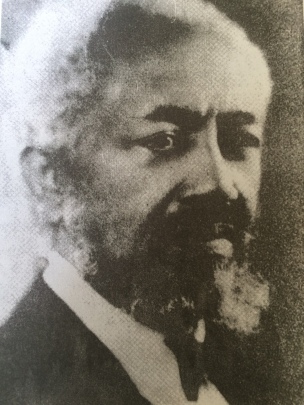
Dajjach Abba Weqaw Berru
Me: Oh no!
The sentence was later changed to imprisonment, I’m not sure what happened to him after that.
But with all his opposers abolished, Tafari was coronated as Hayla Sellase I, Negusa Negast (King of Kings) of Ethiopia during a glamorous ceremony in 1930. The same year that Zewditu and her husband Gugsa died. Not surprising hey?
There was gold and velvet everywhere; the state coach of Imperial Germany was brought to transport the royal couple; the city was beautified and the slums were cleared. The palace was installed with electricity and the main roads tarmacked…the police wore new uniforms…I mean it was really a spectacle.
The world’s journalists were invited to witness it. Even the Italian ones, the traitors!
Part III – The Italians strike again
Me: Oh Italy and Haile Sellasie were on good terms?
Only at the beginning. They were trying to win his trust. When he visited Italy in 1924 during his European tour they shouted ‘Viva Etiopia! Viva Tafari!’
They even signed a peace treaty with him in 1928…it was meant to last for twenty years…its didn’t even survive ten!
Me: Wow…they were out to get us!
It was not just them by the way. At first the British supported them! They made an agreement in 1925 recognizing Western Ethiopia as an exclusive zone of Italian influence…and in return Italy supported the British to build a dam on Lake Tana and regulate the flow of water to Sudan and Egypt.
Me: Really?
Yes. This is despite Ethiopia being a member of the League of Nations and had equal status to both the British and Italians! The League was a mockery!
The British and the French were more interested in luring Mussolini away from Hitler and Europe by sacrificing Ethiopia. So when the Italians purposefully started a border dispute with Italian Somaliland, they turned a blind eye.
The Italians crossed the Marab River and attacked Ethiopia in three different corners on 3rd October 1935. One of them being the town of Adwa where they were defeated by Ethiopians 40 years back!
Me: That was it, we didn’t fight back?
The Ethiopian counter-offensive came late…in January 1936. There was poor coordination between the ranks and they were outnumbered by the Italians four to one! There was some progress by armies in Western Tegre but most of the soliders were demoralized and exhausted; a lot of them poisoned by mustard gas that the Italians were spraying from their planes. Gas that was banned, by the way, in 1925 by the International Red Cross!
Me: That is not cool!
Oh some of them were ruthless! The worst of them, Marshal Rodolfo Graziani, said that he would deliver Ethiopia to Mussolini ‘with the Ethiopians or without them’. I mean they wanted revenge for their humiliation at Adwa. They had twice as many rifles as on the Ethiopian side and they had the skies to themselves…300 to 400 aircraft.
Don’t forget, times had also changed. The men who had grown up in battle and fought at Adwa were gone and replaced by civilian administrators; there had been relative peace after Adwa and just a general decline in martial spirit. The people were no longer under feudal control like in Menelik’s days. Haile Selassie was a very different ruler, he was not a fighter. He had the option of exile given his connections in the global community, and so he took that option.
Me: So we lost…?
Yes. They entered Addis Ababa on 5th May 1936. Mussolini made a speech in Rome saying ‘Ethiopia is Italian’.
Me: So sad…
It was. Well, there were some positives though. The Italians built great roads and buildings, neighbourhoods, factories, electricity and water supply. They started the open market ‘Markato’ which became the largest open market in Africa. They brought cars and skilled mechanics which gave a boost to the development of motor transport.
On the other hand, they also set up hundreds of committees and commissions to mask all their corruption and greed! The Chief Representative of Italy, Marshal Badoglio himself stole half of the 1.7 million Maria Theresa Thalers confiscated from the Bank of Ethiopia.
Their stronghold was mainly in Addis, however. Outside of Addis they were weakened by the Ethiopian Patriotic Resistance force who conducted guerilla warfare against Italian farmers positioned on fertile lands. The Italians were not able to be successful farmers, especially wheat, due to the large amounts of pasta consumed!
Me: The resistance?!!
Yes, a nation-wide movement of all regions and ethnic groups who disrupted communication lines, ambushed convoys, engaged in frontal attacks, shot down Italian aircraft…they lived mainly in the countryside and survived off the land relying on wild animals, fruits and traditional doctors and medicine.
Women served a key role in the resistance too as they were deemed less suspicious. For example, Shawaragad Gadle. She was an undercover spy who was instrumental in the storming of the Italian stronghold at Addis Alam.
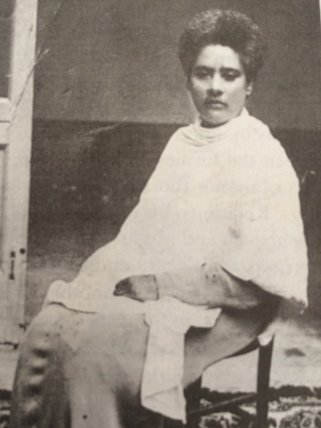
Shawaragad Gadle
All in all though, the resistance battered the Italian troops time and again, they were very vulnerable when the British launched their final campaign of liberation in January 1941.
There was also the Black Lion organization of military officers and civilian intellectuals. The President of the Black Lion organization was Dr Alamawarq Bayyana, he was a veterinary surgeon educated in Britain. The Black Lions put politics over military. They respected the peasantry and had rules against mishandling prisoners of war and seeking exile. Their moto was that ‘one should prefer to be captured by the enemy instead of seeking exile!’
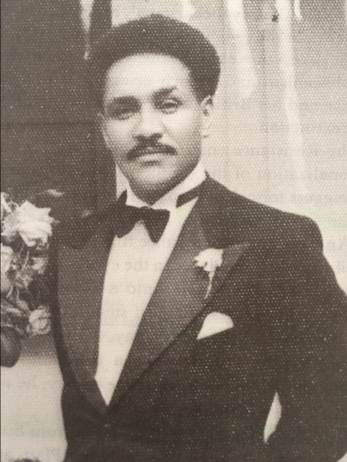
Dr Alamawarq Bayyana, President of the Black Lion organization
Me: But Haile Sellasie was in exile then, right?
You see why they didn’t get along with him? Haha
There was the famous Abraha Daboch and Mogas Asgadom who attempted to kill Graziani on 19th Febraury 1937 in Addis, unfortunately they were unsuccessful and the Italians retaliated against the citizens of Addis by burning, maiming and killing. They especially targeted the educated Ethiopians and many members of the Black Lion organization.
Me: That is so sad! So how did we kick the Italian’s out?
Well they kicked themselves out mostly. They joined the Second World War siding with Hitler. And Mussolini became enemy number one to the British and French!
The British attacked the Italians from Sudan and Kenya. In January 1941, Colonel Daniel Sandford and Major Orde Charles Wingate took Emperor Haile Sellasie from Sudan into Gojjam with a small group of British and Ethiopian troops. The Italians tried to fight back but they were worn down by five years of guerilla warfare and a superior force.
Addis was liberated on 6th April 1941. On the 5th May, Emperor Hayla Sellasie re-entered his capital and regained the throne.
Me: Oh great! Wait…what happened to the resistance?
Well, The Black Lion organization were calling for a populary elected government as opposed to a monarchy and wanted Ethiopia to be liberated by themselves and without foreign powers. But they were seen as enemies by the Emperor and they were persecuted and killed.
Me: What? Oh no! What happened to the British? Why didn’t they stay and colonize us?
The British were devastated by their heavy participation in the second world war and a new global super power was growing strength…the United States.
Me: Ah, of course!
Yes. The US and Ethiopia started to strengthen their relations, especially since the Emperor felt threatened by the British attempt to make him second in line to decision-making on Ethiopia. Also, their political dealings with the Emperor to take control of the Ogaden in exchange for Eritrea backfired when the United Nations supported an independent Ethiopian federation.
Part IV – The American era & Communism
Me: So bye bye Brits, hello Americans?
Something like that. The 1950s and 60s were definitely the ‘American’ era in Ethiopia. They influenced the military, airforce, navy. They made road repairs from the Italo-Ethio war. They even help set up Ethiopian Airlines in 1945 when the Ethiopian delegation at the UN conference approached the Americans and requested their assistance in setting up a civilian airline.
Me: Oh cool, Ethiopian Airlines! How did that happen?
An agreement was made between the American Transcontinental and Western Airline (TWA) and the Ethiopian government that lasted 30 years where TWA would provide managerial and supervisory personnel. Ethiopian Airlines started with five aircraft left over from the second world war which were converted into the passenger version, DC-3. The first flight was made in 1962. The first international flight was to Beijing in 1973.
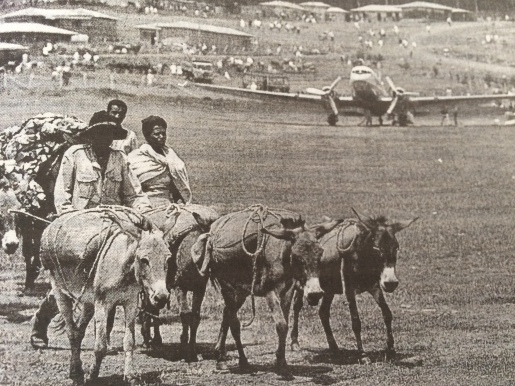
Me: Very cool! Look at the donkeys competing for the runway…haha
The Americans did not want to let go of control for Ethiopian Airlines for some time.
Me: Oh so now they wanted to colonize?
Yes, and the Ethiopians resented it, especially the younger generation. But the Ethiopians managed to achieve self-sufficiency and the first Ethiopian Manager was appointed in 1971. Also, around the same time the Americans shifted their attention to Egypt because the President (Anwar Sadat) was pro-West.
Me: So bye bye Americans…hello Emperor…I guess?
Yes for a little while.
Me: Oh my God…he gets challenged again?
Don’t take the lords name in vain.
Me: Sorry…but what happened this time?
You must realize that the Emperor had a global reputation by this time. He was portrayed as a supernatural being of diplomacy by the media and his foreign friends. He enjoyed his popularity and lavished in it, travelling the world strengthening his foreign relations and also building his popularity at home. He was focused on giving Ethiopia a modern façade to the world.
Me: He was a real Emperor huh?
Absolutely. His birthday and coronation were national holidays and his 80th birthday was celebrated with extraordinary presentations. In 1963, he created the Organization of African Unity (OAU).
But ultimately, his drive to maintain his superior status and grow his reputation took his attention away from day-to-day issues with the country! He just could not see the signs of trouble at home. There was a growing force against him by the intellectuals and ethnicities who wanted equality for everyone and the peasantry who were tired of the increased pressure to produce.
The biggest opposition came from the Ethiopian Student Movement in the 60s and 70s. They slowly radicalized, motivated by the deteriorating situation of the peasantry and urban masses. The more the government tried to repress them the more radicalized they became until they finally revolted in 1974. It was the end of feudalism in Ethiopia.

Student demonstration against the Haile Sellasie regime in Addis Ababa
Me: And that was the end of the Emperor…and the monarchy right?
Yes. Marxism-Leninism was embraced as the interpretation of the Ethiopian reality. The Emperor was killed and the Military took power with ‘you know who’ as the new leader of Ethiopia. You know the rest.
Me: No, not as well as you do! Tell me…
Ok, you have tired me out now, let’s continue next time.
Me: No please…just a summary?
No, you can’t always get what you want! Kids these days!
*Historical content used to write this post is credited to Bahru Zewde, A History of Modern Ethiopia (1885-1974), Addis Ababa University Printing Press, 1992.

Did Bahru Zewdu write that the Black Lion members were persecuted and killed by Haileselassie? That is not true.
This is talk of later day Marxists, who were detractors of Haileselassie and Ethiopia, who ran to grab power but failed, putting power in the hands of a military dictatorship, that killed generations of youth, including most of the Marxist plotters themselves.
We lost our King, his carefully built government ( sixty senior government officials and military officers were killed in prison on a single day, it took 33 years to create a relatively modern government ), and we marched 100 years back.
He we are today.
LikeLike